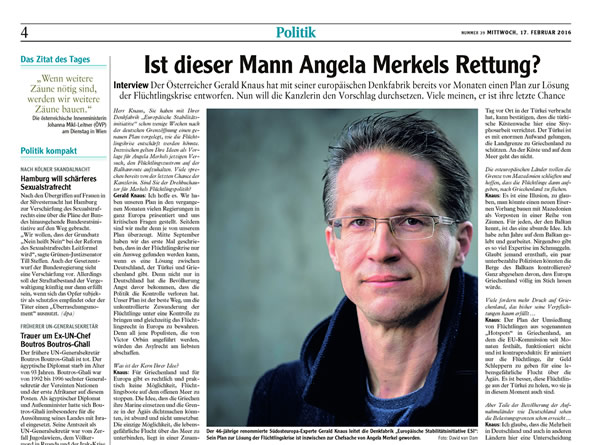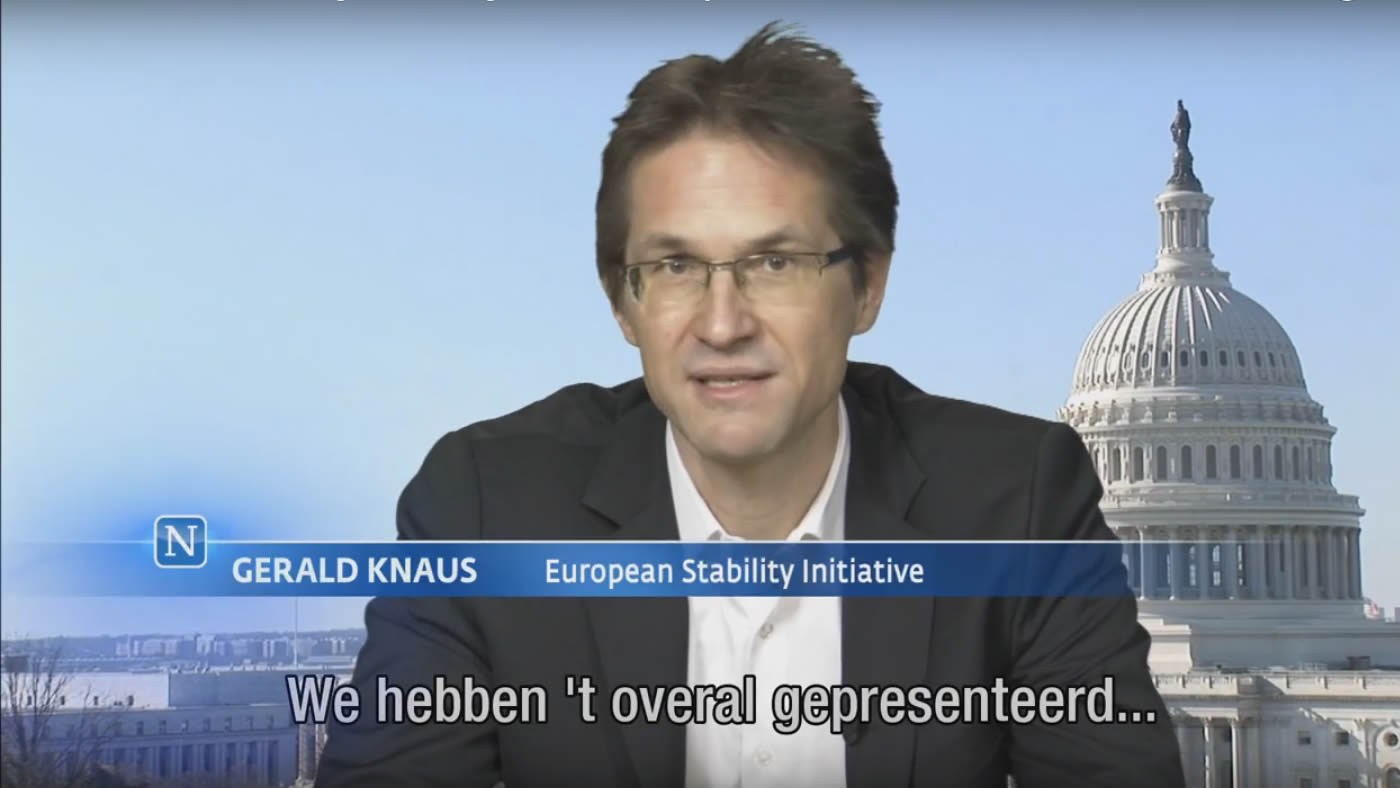In search of EU effectiveness
A policy proposal that is good for Greece, the EU and refugees
Presented in The Hague
11 February 2016
Also available in Turkish: Drucker’in Dersi – Avrupa Birliği’nin Mültecileri Yunanistan’dan Alarak Üye Ülkeler Arasında Paylaştırıp Yeni Yerleşim Yerlerine Gönderme Planı Neden Terk Edilmeli
Plodding and success
The inventor of management studies, Peter Drucker, noted once that, while high intelligence and imagination are far from rare in executive jobs, “high effectiveness” is often conspicuously absent. Many brilliant minds are strikingly ineffectual.
“While others rush around in the frenzy and busyness which very bright people so often confuse with ‘creativity’, the plodder puts one foot in front of the other and gets there first like the tortoise in the old fable.”
The European Union and its institutions are famous plodders. They have excelled at stitching a continent together by putting one foot in front of the other. Take Schengen: invented by a small “coalition of the willing” in 1985, it took until 1995 before France trusted its Benelux neighbours enough to implement the Schengen rules it had itself crafted. Soon Schengen turned out to be so popular and effective that it attracted many other countries to join, even non- EU members like Switzerland and Norway. It became part of EU rules, one of the most popular European projects, transforming lives for citizens and businesses. It has often been challenged, but never replaced, based on many compromises and interests slowly reconciled in endless meetings.
The plodding progress of the European Union institutions in Brussels can, given enough time, change the geopolitics of a whole continent. Yet things often look different when it comes to an unexpected crisis.
Frenzy and failure
In recent months, the European Commission and the European Council have been gripped by frenzy, even panic, as they sought to devise credible policies to deal with the sudden inflow of a million people into the Schengen area. One busy summit and extraordinary meeting followed another. As EU staff rushed through the corridors, many a speech and policy idea was presented that – upon a little reflection – should never have been tabled. But once announced, even obviously unworkable schemes had to be explored, tested and defended, with frantic attempts to stave off their eventual, inevitable failure.
This has certainly been the case for one of the supposed flagship projects in the recent crisis: the idea to set up an internal “relocation mechanism” – a scheme whereby those who arrive to claim asylum in Greece or Italy are relocated to other EU member states according to a key designed by the European Commission, with every country showing “European solidarity” by accepting a number of immigrants and asylum seekers.
This scheme has turned into a humiliating experience for the EU. It was adopted in September in a rare majority decision, outvoting countries who claimed that the scheme was both unworkable and wrong on principle. This led to serious tensions among EU members.
A few months on, even the most Europhile of observers have to admit that the doubters had a point: designed to relocate 160,000 people in two years, it has so far led to the relocation of no more than 500 people. It has failed altogether where it mattered most – in both Italy and Greece. These are embarrassing, even laughable numbers, and they make the EU look strikingly ineffective. Meanwhile the Commission has tried to shame member states into offering more places, while Greece and Italy are under pressure to set up “hotspots” whose precise purpose even EU ambassadors in the same country seem unclear about (Are they registration offices? Refugee camps? Detention centres?). In the meantime, the refugees move on, through Greece and the Balkans into the heart of the European Union, apparently unaware that somebody had other destinations in mind for them.
The search for culprits for this failure has led some in the EU to focus their ire at Greece: If only Greece would register everyone, if only Greece would have set up enough hotspots to accommodate and hold (by force?) its new arrivals, if only it would keep track of people, then the relocation idea would be viable.
Blaming Greek administrative ineptitude is convenient and comes easy to other Europeans, but in this case is completely off the mark. Obviously so, because Italy has had no greater success with the relocation/hotspot approach. In fact, the relocation scheme is profoundly flawed in conception, and could not work, no matter who was responsible for its administration. More than that, in a time of crisis when European ideals are at stake, it is actively harmful.
The current relocation scheme has already eaten up a huge amount of time and political capital, at a moment when both are in short supply. It has spawned many meetings and papers, but the number of people who arrive in Greece from Turkey has not been affected, nor the number moving on from Greece into the rest of Europe. It has increased the sense of distrust and acrimony inside the EU. It has given the EU’s critics a tool to beat European institutions with. It has made the EU look feckless, bumbling and, above all else, ineffective, while exposing it to populist attacks from those opposed even to this very abstract idea of burden sharing.
So what is to be done? A simple reflection makes clear why the relocation scheme from Greece should be scraped and replaced immediately by a voluntary effort based on moral pressure to instead resettle refugees directly from Turkey, ideally already at next week’s EU Council meeting.
Who is relocated? And why?
Many well-intentioned people continue to place their hopes in the relocation scheme as a solution to the refugee crisis. So let us pause for moment to examine what would happen over the next six months if the scheme were implemented as foreseen by its architects. Here is one possible best-case scenario.
Let’s imagine that 100,000 people were to arrive in Greece between 15 February and end of April.
Let’s assume that Greece manages to register every single one of them; that hotspots are set up that not only register but also host these refugees, becoming a string of refugee camps throughout Greece.
Let’s assume that the people who arrive believe in the relocation scheme and patiently wait to be assigned a place in any of the countries where they are supposed to go; and then go. They will not try to cross any borders as they have in the past year, and will not rebel against being held in hotspot/camps until their turn comes
Let’s finally assume that all states that are supposed to take part in this relocation scheme make all places available right away. All administrations involved work smoothly.
Then, at the end of April, the Commission and the EU presidency call a press conference to declare that relocation has been a big European success. A huge mobilisation of resources and total focus by all parties across the EU have made the scheme work as envisaged. And then one journalist asks, like the child wondering about the Emperor’s clothes, what the point of all this was? After all, this scheme will not lead to even one fewer refugee arriving in the EU.
It is much more likely to have the contrary effect. If potential asylum seekers would see this scheme as the only way to get into the EU in 2016, they might – in panic to get of these limited 100,000 places – rush to Greece in the coming months in ever larger numbers. Note that the vast majority of the people who would be relocated from Greece after 15 February are currently in Turkey! The scheme would give people an even bigger incentive to cross the Aegean, to risk their lives and to enrich smugglers.
What would happen once all 100,000 places are taken? It is unlikely that a new relocation quota would pass the Council. Even if it did – for another 100,000 people to be distributed from Greece – the same problem would be posed two months after that at the latest. In the meantime, far-right, anti-immigration, anti-Muslim, anti-refugee parties, boosted by constant press reporting on the progress of the relocations, would get even stronger.
If effective action requires working on the right things, then the relocation scheme fails disastrously because it diverts attention from the only things that really ought to matter now:
- How to prevent more people drowning in the Aegean Sea
- How to disrupt the operations of people smugglers
- How to restore control over the EU and Schengen borders
- How to help substantial numbers of recognised refugees find a safe way to the EU, so the EU can share responsibility for the refugees with Turkey
- How to improve conditions for the many displaced persons who will remain in Turkey.
The relocation scheme achieves none of these things. In fact, it would be actively harmful. In the extremely unlikely best case scenario of full implementation, it would leave the EU facing a worsening refugee crisis with its ability to forge any future consensus compromised, perhaps irreparably.
If the relocation scheme is abandoned next week: what then?
If this scheme – poorly conceived, impractical, and unhelpful even if implemented – were abandoned, what should replace it?
Let us return to the basic fact that the 100,000 people to be relocated from Greece to EU member states in the next few months are not currently in Greece. They are in Turkey.
Imagine if the relocation scheme were not to require these 100,000 people first to cross to Greece (irregularly, in the hands of people smugglers, resulting in many more deaths), but instead could be implemented in a safe and orderly fashion in Turkey.
In recent days, leaders in the Netherlands and Germany have spoken out about the need to take contingents of Syrian refugees directly from Turkey within weeks – in return for Turkish willingness to take back anyone who crosses to Greece from that point onwards.
This is no simple matter: it would require serious preparation and the full attention of already overstretched administrations. It would take some time for the numbers attempting the Aegean crossing to fall away; in the meantime, Greece would need the administrative capacity to process those who reach the islands. The states in the coalition of the willing need to find ways to work with Turkey on an orderly resettlement process, sending a clear signal to these refugees not to get on boats. This would be a serious test of national capacities and European cooperation. It would need to be the main focus on European summits and technical meetings for the coming months. It can be done, but only if it is taken very seriously indeed.
ESI suggests that the February Council meeting in Brussels declares first that the relocation program is scrapped, or at least suspended. At the same time, it calls upon all countries to voluntarily take at least the number of people they would have been required to take from Greece directly from Turkey.
There would be no coercion. In fact, this step would remove a major argument of those who use this scheme to attack the EU.
There would now be strong moral pressure. After all, this voluntary resettlement scheme is not only designed to help refugees – whose fingerprints will be checked against databases of known terrorists – but also to help Turkey, at a moment when it is under immense pressure from Russian military operations in Syria. How could Turkey’s NATO allies refuse to participate in a voluntary burden-sharing scheme, if it supports Turkey, helps refugees and restores control over Europe’s borders?
The European Union needs trust to work. The relocation debate and its subsequent failure have eroded that trust. A voluntary burden-sharing scheme, as part of the Merkel-Samsom plan, could restore it.
This is not a defeat – but the best way forward for European ideals
Some will argue that this would be a defeat. If the EU cannot make even a modest relocation program work, how can it ever have a shared, centrally administered asylum system?
But this argument is based on denial. Unpalatable and unworkable schemes, like building a wall across Macedonia (a non-EU member) with EU support, so as to trap refugees in Greece (an EU and Schengen member) shows the damage that flawed and muddled thinking is doing to European ideals. Clinging to a poorly designed scheme only adds to the damage already done.
The EU will not get a central asylum system without first resolving this crisis. If anti-EU, illiberal parties gain strength on the back of public fear that mainstream parties and the EU have lost control, the political space for collaboration in this critical area may disappear.
Perhaps a centralised EU asylum system is not an appropriate goal. Coping with refugees in large numbers is perhaps possible for strong and democratically legitimized governments, like Germany, Sweden and the Netherlands. The EU as a political entity may never be strong enough to do so. Ironically, if the authority for refugee policy is moved to Brussels, the likely outcome is a less liberal EU stance, with reduced access for refugees.
The debate on future EU asylum policy is a serious one, of course, and arguments can be made on both sides. But anyone who cares about “European ideals” should admit that this moment of crisis is not conducive to a serious debate. The EU has been revealed as strikingly ineffective. The relocation scheme is an abject failure, and could not have been otherwise.
The EU needs to be effective in its response; not in the distant future but in the coming weeks and months. The best way forward is to scrap the relocation scheme at the EU Council next week and to replace it with a voluntary scheme based on the Merkel-Samsom plan. The time to get serious about how to allocate precious focus and resources is now.
Drucker on effectiveness

Austrian writer Peter Drucker, In Search of Effectiveness
Peter Drucker defined the characteristics of effective action as follows: it is action defined by concrete results. It requires working on the right things. It requires clear criteria that enable work on the truly important. Effective executives do not start out with the things they cannot do. Effective executives know that their time is the most crucial limiting factor. To be effective requires eliminating time-wasting activities – reports and monitoring that lead to no results; recurrent meetings that are not focused on what truly matters. An effective executive also takes care not to waste the time of others he or she needs. He or she is always aware that bringing too many people into coordination mechanisms is usually a time waster. As Drucker noted:
“My first-grade arithmetic primer asked: ‘If it takes two ditch-diggers two days to dig a ditch, how long will it take four ditch-diggers?’ In first grade, the correct answer is, of course, ‘one day.’ In the kind of work, however, with which executives are concerned, the right answer is probably ‘four days’ if not ‘forever’.”




 On Dutch news show
On Dutch news show 
